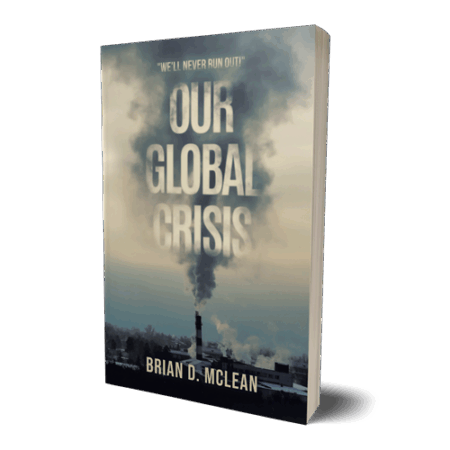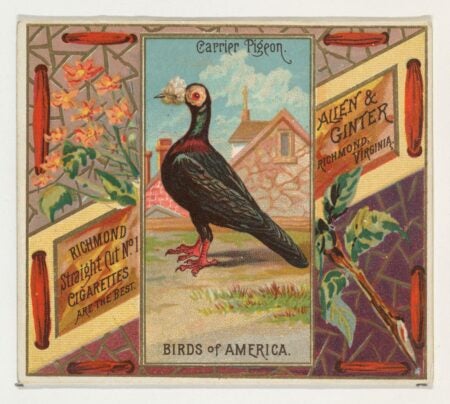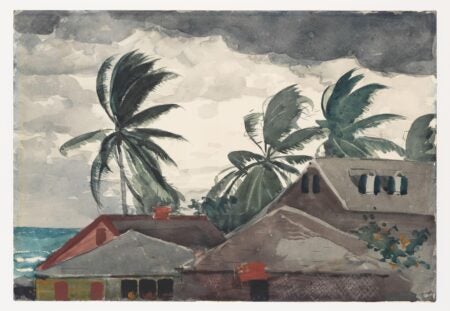Brian D. McLean believes that modern society is at a precarious tipping point—and for more than two decades, he set out to examine why. Our Global Crisis is a long-form work of nonfiction for a general audience that asks readers to slow down, verify, and only then conclude.
He chose a book because the ideas needed a vessel “that could be absorbed slowly, repeatedly, over an extended period of time”—not a thread or video. Over twenty-two years, he built a cross-disciplinary research practice on verifiable evidence and used JSTOR to reach both century-old scholarship and current work without losing rigor.

Cover of Our Global Crisis by Brian D. McLean.
Though McLean believes “everything is at stake,” he takes care to present a balanced take that underpins the entirety of his research. He pointed out, “The human species is not yet powerful enough to obliterate the planet… But we can ‘destroy’ the planet by wastefully consuming its resources and irreversibly damaging the biosphere.” If his argument was going to resonate, the scaffolding beneath it had to be built on verifiable ground.
A system for fact-finding
At the outset of the research process for his book, McLean set a high bar for himself. He emphasized, “I only wanted facts, not ‘my’ facts, but verifiable facts.” The rulebook that followed is deceptively simple: “The work needs to be transparent, credible, trustworthy, and unbiased.”
He designed his process to meet that bar, front‑loading years of research before drafting. He recounted, “I spent the first seven years doing research, searching for solid, verifiable material… Before my first sentence was complete the bulk of… bibliography and references… were already complete.”
To keep such breadth coherent, he built structure into discovery. “To keep control of the project, I categorized and compartmentalized the questions… and carefully noted the developing relationships and interdependencies.” When he hit a knowledge gap, momentum never trumped rigor. He clarified, “When I felt I lacked the knowledge to be credible, I stopped work… and took additional time to research a topic.”
“Personally, I have used and recommend JSTOR… Primarily, I trust them.”
His inclusion test for evidence stayed consistent throughout: could he stand behind the claim? “Was I able to stand behind it? If there was insufficient evidence or the source… was questionable… then I chose not to include it.”
With the bar set, McLean needed a research home that could match his method. That’s where JSTOR came in: a single place to search broadly, verify deeply, and keep the record straight.
That’s where JSTOR came in: a single place to search broadly, verify deeply, and keep the record straight.
Where JSTOR fit and why it mattered
McLean turned to JSTOR to do two hard things at once: recover older scholarship and manage modern discovery across disciplines. He used it to access, download, and cite hundreds of references, including sources “more than 100 years old,” while the platform’s search and Workspace and search tools kept the bibliography coherent as the project scaled.
His inquiry ran on twin tracks—the deep past and the modern present—and he used the same platform for both. JSTOR’s tools accelerated the process without compromising standards: “Services like JSTOR excel… It is possible to do both simple and advanced searches… JSTOR also provides… a Workspace for organizing citations, an AI research tool, and a resource library.”

Allen & Ginter. Carrier Pigeon, from the Birds of America series (N37). 1888. The Metropolitan Museum of Art.
When the world grew noisy (especially during fast‑moving events), he defaulted to reputable infrastructures. “I generally relied upon reputable research services, such as JSTOR,” he explained, “to perform my database queries.” His recommendation is unambiguous: “Personally, I have used and recommend JSTOR… Primarily, I trust them.”
Preservation as a principle

Winslow Homer. Hurricane, Bahamas. 1898. The Metropolitan Museum of Art.
The alignment with JSTOR is also philosophical. McLean worries about knowledge loss and technological fragility. “I was extremely pleased to find that this organization tackled these concerns… Preservation and stewardship of knowledge is literally in your mission statement.”
“I was extremely pleased to find that this organization tackled these concerns… Preservation and stewardship of knowledge is literally in your mission statement.”
The value proposition, to him, is civilizational: “It is of the highest importance that organizations like JSTOR not only continue to exist but thrive… May the loss of knowledge… never occur again.”
Lessons learned
The method changed the researcher as much as it shaped the book. “My research taught me to dig deeper, to look for the source… to find evidence‑based sources,” McLean said.
“It is of the highest importance that organizations like JSTOR not only continue to exist but thrive.”
Early in the journey, trust mattered. He shared, “This is where JSTOR came into the picture… They gained my trust and I relied on them heavily in the early days of my research.”
The outcome speaks to the patience of that approach: “The twenty odd years spent writing were needed to craft my thoughts into words… and analyze my work to ensure that I was in a position to… defend my position.”
Building on evidence, together
Our Global Crisis is an invitation to slow down and do the work of observation and verification before drawing conclusions. The same can be said of the infrastructure behind it. Evidence takes time, and it requires places built to keep knowledge findable, citable, and safe. As McLean reminds us, “Everyone can make a difference, including me.”
If you are embarking on your next research project, start with JSTOR by signing in with your institution or registering for a free personal account.